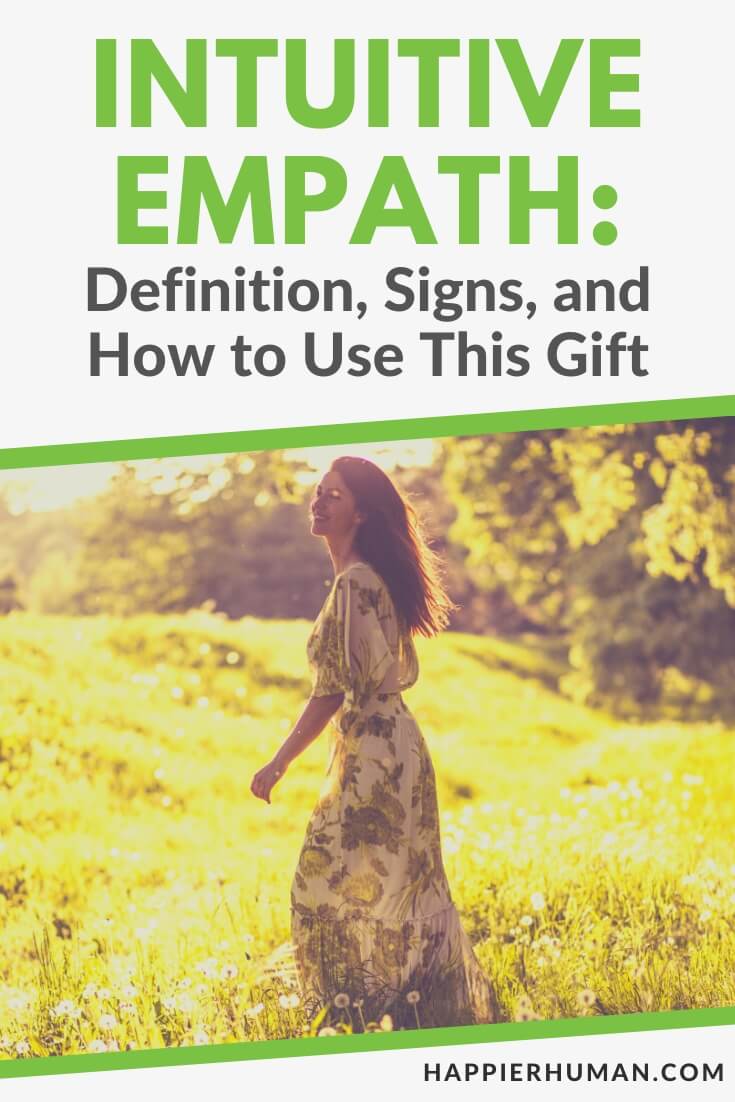Have you ever met someone who can read you like an open book without sharing too much about yourself?
Someone who picks up on your emotional vibe just by being around you for a couple of seconds.
Someone who can immediately tell that you’re going through a rough patch just by hearing your voice at the other end of the line.
Or perhaps the person whom I’m describing here is you.
Maybe you’ve lived your entire life wondering why you’re so sensitive to other people’s feelings.
If what I’m saying here sounds strikingly familiar, then chances are you might be an intuitive empath.
Before you jump to any conclusion, know that intuitive empathy is neither part of the supernatural realm nor an anomaly, despite being a rare ability.
As you will discover throughout this article, intuitive empathy is a fantastic ability and a gift that you can use to cultivate compassion and understanding in people’s lives.
What is Empathy?
Empathy is the ability to understand or feel what another person is feeling.
Putting yourself in someone else’s place can be difficult, especially when they’re suffering.
However, it’s a valuable ability as it allows you to understand the person's situation better.
Empathy is an experience that gives rise to a tendency to help others and express compassion naturally and spontaneously.
In relationships, empathy is the foundation of emotional support, helping partners understand each other’s needs and difficulties. [1]
But empathy is also one of the most complex concepts in psychology, with so many subjective nuances that experts still have trouble defining it. [2]
Despite its subjective character, this human ability can be approached as a step-by-step process.
Let’s say a friend is pouring out her heart by telling you she’s feeling sad and overwhelmed because of a recent breakup. To show empathy towards her difficulties means to:
- See the situation through her eyes; to understand her perspective.
- Refrain from criticism and judgments
- Recognize her emotions (and reflect them)
- Share the emotional burden of her feelings
Long story short, empathy plays a crucial role in human interactions as it allows us to forge emotional bonds with friends, family members, coworkers, and life partners.
Types of Empathy
Most experts agree there are three types of empathy: cognitive, emotional, and somatic.
It’s important to note that people usually experience empathy in all three forms, even though we might be inclined towards one form or another.
1. Cognitive empathy
It is the ability to understand another person’s mental state – to think how they think – without necessarily feeling their feelings.
In a way, cognitive empathy appeals to your intellect rather than your emotions.
2. Emotional empathy
While cognitive empathy refers to mental perspective-taking, emotional empathy is the vicarious sharing of emotion. [3]
In other words, emotional (or affective) empathy describes a range of emotions – like joy, anger, and sympathy – that you experience in response to other people’s feelings or situations. [4]
3. Somatic empathy
This form of empathy involves a physical reaction in response to a situation that another person is experiencing.

For example, mirroring another person’s posture or letting out a deep sigh as a response to something painful they’re sharing.
What is An Intuitive Empath
Do you tend to feel things first and then think about them later?
Are you so devoted to other people’s emotions that your body reacts to their feelings as if they were your own?
If that’s the case, you might be an intuitive empath.
Intuitive empaths are deeply attuned to what the people around them are feeling – physically and emotionally – and experience those sensations as if they were their own.
Sometimes, a look is all it takes for them to discover the painful wounds in your soul.
Thanks to their unique ability to look deep within one’s soul, intuitive empaths can also bring out the best in everyone with whom they interact.
In a world where many of us feel confused and disconnected, empaths spring into action, knowing exactly what to say and when to say it.
Although it may sound like intuitive empaths are somehow out of this world, there’s nothing magical or supernatural about intuitive empathy.
Most experts speculate that people who empathize strongly with those around them were either born with a brain that favored the development of this ability or raised in an emotionally rich and safe environment.
But even if you’re not an intuitive empath, there are ways to strengthen your empathy skills so you can control what you feel, when you feel it, and how to use it to help others.
This can benefit all walks of life: career, relationships, wellness, and spirituality.
The Downside of Intuitive Empathy
Although intuitive empathy can be a wonderful gift, there are times when this ability can be a burden as well.
Because they resonate strongly with other people’s feelings, intuitive empaths can sometimes feel overwhelmed, especially if they don’t know how to distinguish between their thoughts and emotions and those of others.
In other words, exercising this ability too often can cause empaths to feel emotionally burdened, physically stressed, and mentally tired.
Another downside of intuitive empathy is that people who possess this gift can easily find themselves in co-dependent relationships and are often at risk of developing compassion fatigue.
To avoid these unpleasant situations, intuitive empaths need firm boundaries, alone time, and constant effort toward building healthy self-esteem.
7 Signs of An Intuitive Empath
1. You Are Emotionally Open and Sensitive to Others’ Feelings
The most obvious sign of an intuitive empath is their openness and sensitivity towards emotions, not just theirs but other people’s.
In other words, you find it easy to experience and discuss emotions and intuitively guide people towards exploring their feelings.
The risk here is to be easily hurt by ‘cold’ or emotionally abusive people or feel lost in situations where you need to exercise character strength.
2. People Constantly Tell You that You’re a Good Listener
Being an intuitive empath means you’re a good listener.
People ‘open up’ to you quickly and leave the conversation feeling relieved and understood.
Your ability to listen empathically draws others toward you, but it’s also why social interactions often leave you drained.
So, take some alone time whenever your social battery is low.
3. You are Intuitive
Intuition is that inner voice, that feeling that you know what will happen even though you have no reasonable explanation.
This process relies on past experiences, knowledge, and information accumulated over time.
Intuition can materialize, for example, in an inspired financial decision or in choosing the right life partner.
This trait is extremely useful for intuitive empaths as it can help them build meaningful relationships and avoid potentially toxic interactions.
4. You Prefer Hanging Out in Small Groups
Intuitive empaths usually feel overwhelmed by large crowds and avoid places like concerts, shopping malls, and popular beaches.

They are instead withdrawn and prefer to spend their time around one person or in small groups.
5. You Need Your Alone Time
As an intuitive empath, you can’t help yourself from being there for others whenever they’re going through something difficult.
But because you are always available for others, you often feel drained of energy.
Remember that it’s perfectly normal and healthy to take time for yourself and avoid emotional overload.
6. You Enjoy Spending Time in Nature
If you’re an intuitive empath, everyday life can often feel overwhelming, and nature is the ideal place to recharge emotionally and spiritually.
Forests, wild beaches, or mountain trails are the perfect places to find peace and inner balance.
It’s ok to take a couple of days off and wander into the wilderness if that nourishes your soul.
7. You Get Easily Overwhelmed in Romantic Relationships
As a highly empathetic person, you might avoid romantic relationships precisely because of the high emotional involvement required by such a commitment.
A fear of losing your identity may arise, so it’s crucial to define the parameters of the relationship early on.
Once again, set clear boundaries with your significant other and ask for alone time.
5 Ways to Use the Gift of Intuitive Empathy
Allow me to start with one of the most important, most obvious ways to use the gift of intuitive empathy – self-awareness.
As an intuitive empath, your ability to look deep within yourself and gain a profound understanding of who you are (and who you can become) is unparalleled.
So, before you use this gift for the good of others, make sure you stay connected to your emotions and inner world.
Feeling empathy toward others is difficult when you’re living an unexamined life, disconnected from yourself.
Long story short, start by helping yourself before figuring out how to help others.
1. Forge Meaningful and Lasting Relationships
Connection is one of our most basic psychological needs.
Humans are social creatures designed to interact with each other and forge relationships to survive and thrive.
In fact, our happiness and well-being depend on the quality of the relationships we share with friends, family members, coworkers, and life partners.
In this context, intuitive empathy is a valuable gift as it allows you to lay down a solid foundation of understanding and psychological safety.
When you’re naturally inclined to listen empathically and appreciate emotional experiences, people feel safe enough to show you the hidden parts of their souls.
This level of trust with which others invest you can make you a valued friend or life partner.
2. Assist Someone Who’s Going Through a Rough Patch
We all go through hard times in life, but each of us needs different things to bounce back.
Some are going through tough breakups and need a shoulder to cry on, while others have financial difficulties and need specific advice.
But one thing that’s universally desired and beneficial for anyone who’s going through a rough patch is acceptance and understanding.
Being an intuitive empath means you have the emotional resources to create a safe and non-judgmental space for another person, regardless of what difficulties they might be going through.
Intuitive empathy allows you to sit with their suffering, contain their painful emotions, and provide the emotional comfort they need to overcome their struggles.
Sometimes, that’s all one needs to find their way out of the darkness and recover after a breakdown.
3. Help People Uncover Their Potential
As I said earlier, intuitive empathy allows you to understand your inner world profoundly.
But this gift can also assist you in helping others explore their emotional universe and internal resources.
Intuitive empathy can turn a simple exchange of ideas into a profound conversation from which the other person leaves wiser and calmer.

Because you’re naturally inclined to take the conversation to a deeper level, people with whom you interact can uncover aspects of their identity that they couldn’t even imagine before talking to you.
The valuable insights that your intuitive empathy can bring forth open new possibilities for anyone who embarks on a journey of self-exploration with you as their guide.
4. Achieve a Profound Level of Intimacy with Your Partner
One of the most valuable ways to use intuitive empathy is by cultivating a wonderful romantic relationship.
If you find the right person, someone who truly appreciates and cares for you, this gift can be a priceless investment that will bear fruit in the long run.
Empathy helps you discover your partner’s needs and creates a sense of safety that encourages them to share intimate aspects of their identity.
This builds trust and fosters emotional closeness, two elements that are crucial for the well-being of the relationship.
5. Contribute to a More Inclusive Community
In general, the more mistrustful and less empathetic a country’s population is, the worse its overall quality of life will be and the greater the need for restrictions, laws, policing, and coercive measures.
Therefore, empathy can positively impact a society’s overall quality of life, fostering positive social, economic, and political change.
Empathy cultivates closeness; closeness creates trust and trust results in good collaborative relationships.
Think about it this way. You can feel what an African American person goes through when discriminated against based on race without showing compassion towards their cause.
Showing empathy towards all those around you, regardless of race, politics, language, sexual orientation, or religious beliefs, help unify the community in which you live.
A unified community is a solid and happy community where all members feel protected and safe.
Final Thoughts on Intuitive Empathy
When it comes to empathy, society and culture play a significant role in the development of this amazing phenomenon. [5]
However, some of us seem to be born with the gift of intuitive empathy—people who can easily be in tune with others’ feelings.
If you’re an intuitive empath, you can use this gift to:
Long story short, being an intuitive empath is a wonderful gift as long as you learn to set boundaries with others and work on strengthening your highest sense of self.
References
| [1] | L. Verhofstadt, I. Devoldre, A. Buysse, M. Stevens, C. Hinnekens, W. Ickes and M. Davis, “The Role of Cognitive and Affective Empathy in Spouses' Support Interactions: An Observational Study,” Plos One, vol. 11, no. 2, 2016. |
| [2] | D. Jeffrey, “Empathy, sympathy and compassion in healthcare: Is there a problem? Is there a difference? Does it matter?,” Journal of the Royal Society of Medicine, vol. 109, no. 12, 2016. |
| [3] | A. Smith, “Cognitive Empathy and Emotional Empathy in Human Behavior and Evolution,” The Psychological Record, vol. 56, p. 3–21, 2006. |
| [4] | H. L. Maibom, “Affective empathy,” in The Routledge Handbook of Philosophy of Empathy, Routledge, 2017, p. 11. |
| [5] | W. Chung, S. Chan and T. G. Cassels, “The Role of Culture in Affective Empathy: Cultural and Bicultural Differences,” Journal of Cognition and Culture, vol. 10, pp. 309-326, 2010. |

Alexander Draghici is a licensed Clinical Psychologist, CBT practitioner, and content writer for various mental health websites. His work focuses mainly on strategies designed to help people manage and prevent two of the most common emotional problems – anxiety and depression.
Finally, if you want to identify YOUR personality type, then take one of these 11 personality tests to better understand what makes you tick.


